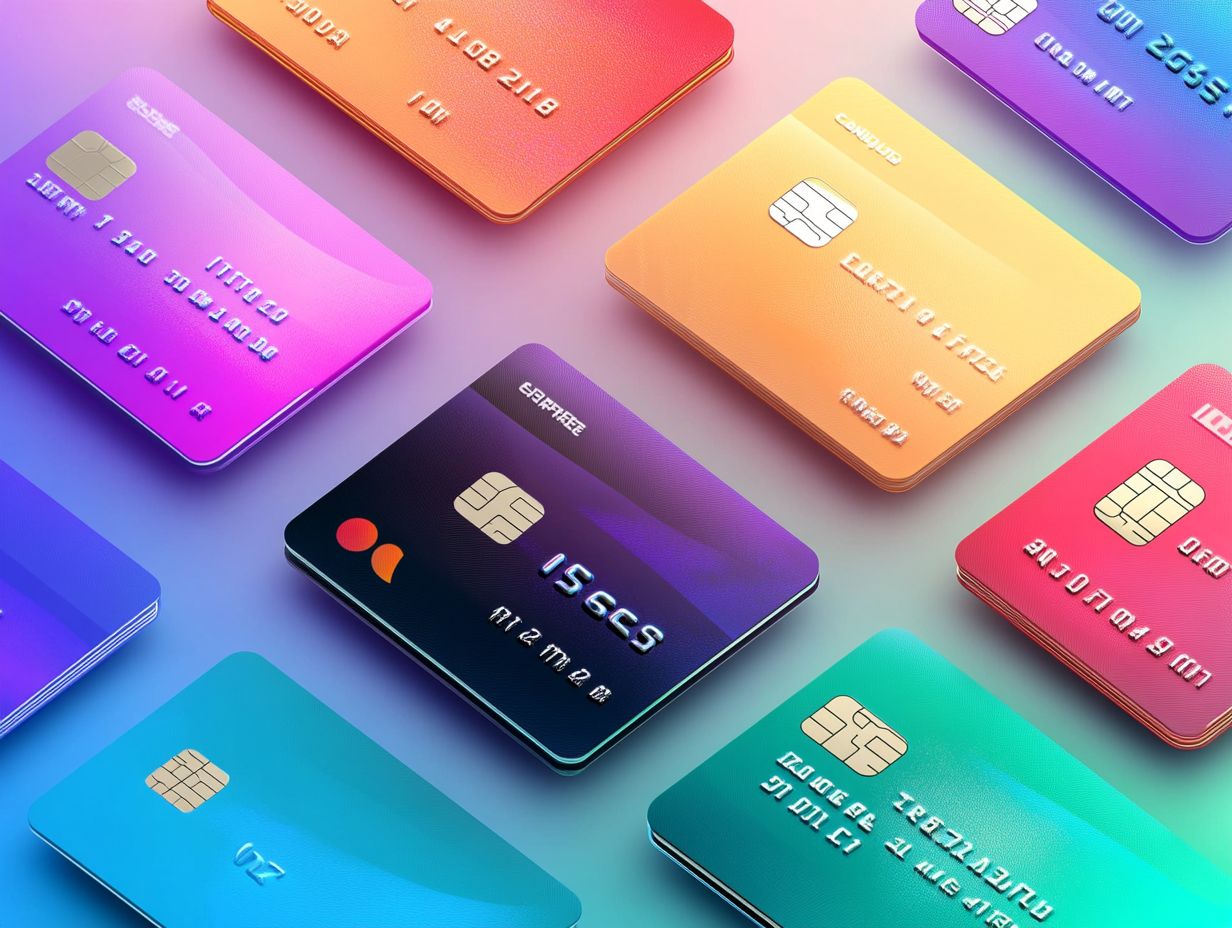Best Credit Cards with Low Fees Compared
Navigating the world of credit cards can feel daunting, especially with the multitude of fees that can accumulate in the blink of an eye.
This article will guide you through the most crucial fees to consider when selecting a credit card, from annual fees to foreign transaction costs. You ll learn how to sidestep those high charges and uncover lesser-known fees that might take you by surprise.
By the end, you’ll be well-prepared to make informed decisions. This ensures you select a card that aligns with your financial goals and lifestyle.
Get ready to uncover the ultimate credit cards with the lowest fees that suit your needs!
Contents
- Key Takeaways:
- 1. Annual Fee Comparison
- 2. Foreign Transaction Fee Comparison
- 3. Balance Transfer Fee Comparison
- 4. Cash Advance Fee Comparison
- 5. Late Payment Fee Comparison
- 6. Overlimit Fee Comparison
- 7. Returned Payment Fee Comparison
- 8. Penalty APR Comparison
- 9. Introductory APR Comparison
- 10. Rewards Program Fee Comparison
- 11. Credit Score Requirement Comparison
- 12. How Customer Service Makes a Difference
- 13. Online Account Management Comparison
- 14. Fraud Protection Comparison
- 15. Additional Benefits Comparison
- What Fees Should You Look Out for When Choosing a Credit Card?
- Frequently Asked Questions
Key Takeaways:

- Choose a credit card with low annual fees to save money in the long run.
- Avoid foreign transaction fees by choosing a card with no fees for international purchases.
- Consider cards with low balance transfer fees if you plan on transferring from another card.
1. Annual Fee Comparison
When you compare credit cards, grasping the annual fee is essential. This fee can significantly shape your overall financial strategy and the value you gain from rewards programs, particularly those offered by premier issuers like Capital One and American Express. Their annual fees can range dramatically from $0 to $95, influencing customer satisfaction and decision-making.
Take the Chase Sapphire Preferred card, for example. It carries a $95 annual fee, but in return, it offers substantial travel rewards and purchase protections, making it a favored option for frequent travelers. Some no-annual-fee cards might provide limited rewards, which could mean you’re missing out on maximizing your benefits.
It’s crucial to evaluate how these fees align with potential rewards points. Many rewards programs grant you 1 to 2 points per dollar spent, with even higher multipliers in specific categories. Analyzing how your spending habits affect the value of these points is vital, especially for travel purchases where a single redemption can lead to significant savings.
By understanding the intricacies of these costs, you enable yourself to make informed decisions that align seamlessly with your financial aspirations.
2. Foreign Transaction Fee Comparison
Foreign transaction fees can be a sneaky expense for travelers, so it s crucial to compare credit cards that waive these fees. This small detail can significantly enhance the value of your travel rewards and help you save on eligible purchases made abroad.
These pesky fees, typically ranging from 1% to 3%, can unexpectedly inflate your overall expenses while exploring new destinations, impacting your budget in ways you didn’t foresee. If you’re planning an international trip, choosing credit cards that eliminate these charges not only maximizes your savings but also offers peace of mind when making transactions overseas.
Consider popular travel rewards cards like the Chase Sapphire Preferred and Capital One Venture. They come with enticing benefits, such as travel insurance and opportunities for bonus points, making them outstanding options for those who love to travel.
With features that include no foreign transaction fees, you can ensure that every dollar you spend abroad contributes to your rewards without any added costs.
3. Balance Transfer Fee Comparison
Understanding balance transfer fees is crucial for effective financial planning, especially when you’re considering credit cards that come with promotional offers designed to reduce or eliminate these fees. This can greatly enhance your management of how much credit you use.
These fees, usually calculated as a percentage of the total amount transferred, can significantly diminish the savings you might expect from moving balances to lower-interest accounts. By comparing different credit cards, including travel credit cards with no foreign transaction fees, you can uncover options that feature lower fees and offer extended promotional periods, allowing for interest-free payments for a specified time.
To maximize your savings, it’s wise to develop a strategic plan that emphasizes making aggressive payments during the promotional period while steering clear of new charges on transferred balances. This approach can help you cultivate a more manageable financial situation as you move forward.
4. Cash Advance Fee Comparison
Cash advance fees can vary significantly across credit cards. It’s essential to understand these fees and the associated interest rates if you’re considering tapping into your credit line for immediate cash needs.
These fees typically range between 2% to 5% of the amount advanced, depending on your card issuer. Major banks like Wells Fargo and Chase often impose a percentage of the withdrawal along with a flat fee, which can add up quickly.
For many consumers, these fees can impact budgeting, leading to unexpected costs that can escalate with high interest rates. Being aware of these charges influences your decision to use cash advances and shapes your broader financial strategies, possibly prompting you to explore alternatives with lighter fees.
5. Late Payment Fee Comparison
Late payment fees can significantly inflate your overall credit card costs. It’s crucial to understand these fees for effective account management and to avoid high interest rates on your outstanding balance.
Different credit card issuers have unique ways of structuring these fees. You might encounter a flat rate of around $25 for your first late payment, but subsequent delays can ramp up those charges to $35 or more. Missing payment deadlines can also tarnish your credit score, complicating your ability to secure favorable loan terms.
To avoid late payment fees, try these tips:
- Set up automatic payments
- Use reminder alerts on your smartphone
- Keep a calendar that marks due dates
By actively monitoring your payment schedules, you can ease the burden of late fees and foster a healthier financial future.
6. Overlimit Fee Comparison
Overlimit fees can catch you off guard, racking up unexpected charges on your card. That s why it s crucial to compare credit cards based on how they handle credit utilization and whether they impose these fees.
Understanding these fees enables you to make well-informed decisions about your credit options. Different card issuers have unique policies regarding exceeding credit limits. Some may simply decline a transaction, while others might allow it, leading to an overlimit charge.
Your satisfaction can hinge on how well these situations are managed. Many cardholders feel frustrated by hefty fees, especially when blindsided by sudden charges. Conversely, some appreciate issuers that provide clear guidelines and timely alerts, significantly reducing the chances of exceeding their limit.
7. Returned Payment Fee Comparison

Returned payment fees can unexpectedly weigh on your finances. This underscores the importance of meticulous account management and strategic planning to avoid costs that can accumulate across multiple credit cards.
You typically incur these fees when a payment can’t be processed due to insufficient funds (having less money than needed for a payment), closed accounts, or a bank’s reluctance to honor the charge. Card issuers often have vastly different policies regarding these penalties. Some may impose a flat fee, while others may use a tiered system based on the payment amount.
To avoid these pesky charges, effective financial planning becomes paramount. Consider implementing these strategies:
- Track your account balances with precision.
- Set up automatic payments for at least the minimum amounts.
- Maintain a buffer in your bank account to accommodate unexpected charges.
8. Penalty APR Comparison
Understanding penalty APRs is crucial for you as a credit card user. These elevated rates can significantly impact your financial well-being if you’re not careful with how you utilize credit and manage payments.
When you miss a payment or go over your credit limit, many issuers may impose a penalty APR, which can be considerably higher than your standard rate. Common triggers for this increased rate include failing to make at least the minimum payment by the due date or demonstrating a pattern of late payments.
Different issuers have varying policies regarding penalty rates. For example, some might implement the higher rate after just one missed payment, while others could wait for two or more. To maintain those favorable interest rates, it’s essential for you to regularly review your account statements, set up reminders for due dates, and automate payments whenever possible.
This proactive approach can help you protect your credit standing and avoid those costly penalties.
9. Introductory APR Comparison
Introductory APR offers can be invaluable financial tools for you, enabling you to take advantage of lower rates for a limited time. Don’t miss out! Comparing these offers across various credit cards can lead to incredible savings during your financial planning.
Typically, these offers last anywhere from six to eighteen months, depending on the issuer and the specific features of the card. By grasping how these introductory periods function, you can strategically manage your balances especially if you’re eyeing high-ticket purchases (expensive items) or looking to consolidate debt (combining multiple debts into a single payment for easier management).
For example, Chase Sapphire might present appealing introductory APRs tailored for travelers and rewards earners, while American Express often shines in customer service and benefits that align with your lifestyle preferences. Carefully evaluating these offers can lead to significant savings and help you establish efficient credit management practices.
10. Rewards Program Fee Comparison
Rewards program fees can significantly diminish the overall value of credit cards, making it crucial for you to evaluate these fees when comparing the best cards that offer cash back and attractive earning rates.
Many consumers often overlook these fees, believing that a high earning rate alone guarantees greater benefits. However, certain rewards programs may impose monthly or annual fees that can chip away at the rewards you accumulate, ultimately impacting how valuable that credit card truly is.
For example, while some cards boast generous cash back percentages, those hefty fees can easily outweigh the benefits for users who don t spend enough to offset these costs. It s essential for you to compare various options, scrutinizing both fees and potential rewards, to find a card that aligns perfectly with your spending habits and maximizes your earning potential.
11. Credit Score Requirement Comparison
Credit score requirements can differ significantly across various credit cards, influencing your application process and determining your eligibility for rewards programs. This ultimately impacts your level of satisfaction as a customer.
Typically, credit scores fall into several categories: excellent (750 and above), good (700-749), fair (650-699), and poor (below 650). If you have excellent credit, you’re likely eyeing premium cards that offer lucrative rewards and benefits. On the other hand, those in the fair range might encounter options with more modest perks but fewer qualifications to worry about.
For anyone looking to boost their credit score and unlock superior credit card options, focusing on timely payments, keeping your credit utilization low (using a small portion of your available credit), and regularly checking your credit reports for discrepancies are vital strategies. Enhancing your credit score is a journey that requires time and patience, but the rewards better terms and enticing perks are well worth the effort.
12. How Customer Service Makes a Difference
Customer service quality is crucial when comparing credit cards. After all, great help can elevate your experience and satisfaction when managing accounts or resolving issues.
As you explore different card issuers, you’ll find that those with higher customer service ratings often respond quickly and effectively to your queries. Many have shared stories about frustratingly long wait times or unhelpful replies, which can dampen enthusiasm.
Issuers that prioritize responsive and knowledgeable support teams create loyalty among their users. It’s clear that having access to efficient and friendly assistance significantly shapes your overall credit card experience.
13. Online Account Management Comparison
Online account management has become essential for anyone using a credit card. Many providers offer premium features that streamline expense tracking and enhance financial planning.
These tools not only improve your experience but also help you make informed spending decisions. Many card issuers provide intuitive budgeting tools that categorize your expenses, allowing you to see where your money goes each month.
Real-time transaction tracking features give you greater control over your finances by letting you monitor purchases as they happen.
However, the usability of mobile apps can vary greatly among providers. Some offer seamless interfaces that provide quick access to your account information, alerts, and payment options. This variety allows you to choose features that best suit your financial goals and habits, ensuring a tailored approach to managing your finances.
14. Fraud Protection Comparison

Fraud protection is a vital feature of credit cards. Understanding the nuances in protection measures among different card issuers is key to enhancing your financial security and overall satisfaction.
Each provider has unique levels of security that can affect your experience as a cardholder. For example, some issuers utilize:
- Real-time transaction monitoring
- Sophisticated algorithms to detect unusual spending
- Zero liability policies, meaning you won’t have to pay for unauthorized charges
By evaluating the effectiveness of these measures in real-world scenarios, you’ll see just how crucial it is to choose a credit card that offers comprehensive protections. This choice fosters a sense of security and ensures your finances remain safeguarded in an ever-evolving digital landscape.
15. Additional Benefits Comparison
Additional benefits offered by credit cards can greatly enhance their value. Features like travel insurance and purchase protection stand out among the premium offerings that provide peace of mind.
Beyond these key advantages, many credit cards present unique perks tailored to your specific needs. For instance, some cards provide exclusive access to airport lounges, making your travel experience more comfortable. Others offer cashback on everyday purchases, catering to your budget-conscious side.
You can redeem rewards points for personalized experiences, such as dining or entertainment options. These diverse benefits not only complement existing rewards programs but also serve as customized financial tools. This ensures you can maximize your spending potential while enjoying confidence in your financial decisions.
What Fees Should You Look Out for When Choosing a Credit Card?
When selecting a credit card, keep an eye on the fees that may affect your satisfaction and finances. Annual fees, late payment fees, and foreign transaction fees can significantly impact your budget.
Understanding these fees helps you make informed decisions that align with your financial goals. For instance, cash advance fees can be steep, leading to extra costs.
Be cautious of over-the-limit fees, which can add up if you exceed your credit limit. Balance transfer fees, which are charged when transferring debt from one card to another, can also affect how effectively you manage debt repayment.
Being aware of these charges is essential for optimizing your credit card use and avoiding unwelcome surprises on your statements.
How Can You Avoid Paying High Fees on Credit Cards?
To avoid high fees, actively plan your finances and manage your credit card usage effectively. This way, you can use your cards without incurring unnecessary costs.
Make timely payments to avoid late fees, which can hurt your overall debt. Choosing a credit card that fits your spending habits is crucial; look for cards with no annual fee or ones that offer rewards for your regular purchases.
Understanding the terms and conditions of any credit card, like interest rates and penalties, is key. By managing these factors well, you can have a better credit card experience that improves your financial health.
What Are Some Lesser-Known Fees to Watch Out for on Credit Cards?
Many people overlook lesser-known fees, such as inactivity fees and foreign transaction fees. These can disrupt your financial planning if you’re not aware of them.
These fees might appear unexpectedly on your monthly statement, leading to surprise expenses. For example, an inactivity fee could apply if you don t use the card for a few months, while foreign transaction fees can add up during international trips.
If you don t understand these potential charges, you may miss opportunities to manage your money better. Stay informed about these fees to ensure smart credit usage, ultimately enhancing your financial health.
How Can You Negotiate or Waive Credit Card Fees?
Negotiating or waiving credit card fees can greatly improve your satisfaction and financial management. It allows you to secure better terms on your accounts.
Use effective strategies and choose the right timing to talk with card issuers. It helps to start these conversations during promotions or after receiving annual fee increase notices.
Present a strong case by sharing your loyalty and history of timely payments. Many customers have successfully waived fees simply by asking. For example, one person eliminated a $95 annual fee after demonstrating a solid payment history. Confidence and preparation can lead to positive outcomes!
What Are the Benefits of Choosing a Credit Card with Low Fees?
Choosing a credit card with low fees offers many benefits for you. It enhances your financial management and boosts your satisfaction as it lowers the overall cost of credit. For a detailed overview, check out our credit card fees comparison.
This allows you to free up funds for other essential spending. By cutting down on unnecessary expenses, you can allocate your resources more effectively toward important bills or savings goals.
For example, a credit card that comes with no annual fee and attractive interest rates can significantly elevate your financial strategy. This enables you to focus on accumulating rewards without the stress of hidden costs.
Cards like the Chase Freedom Unlimited or the Discover it Cash Back card not only keep fees low but also feature attractive cash-back programs. This helps you build long-term financial gains!
This blend of affordability and valuable rewards enables you to make smarter purchasing decisions while enjoying the perks that responsible credit use brings.
Frequently Asked Questions

What are the best credit cards with low fees?
Some of the best credit cards with low fees include:
- Chase Freedom Unlimited
- Citi Double Cash Card
- Capital One Quicksilver Cash Rewards Credit Card
What fees should I look out for when comparing credit cards?
When comparing credit cards, it’s important to look out for:
- Annual fees
- Balance transfer fees
- Foreign transaction fees
- Late payment fees
Are there any credit cards with no fees at all?
While most credit cards come with some fees, there are a few that have no fees at all. For those interested in finding the best options, comparing low-interest credit cards can help you identify cards with favorable features. These include:
- Discover it Cash Back
- Bank of America Cash Rewards Credit Card
- Capital One VentureOne Rewards Credit Card
How can I find the best credit card with low fees?
To find the best credit card with low fees, you must research and compare different cards. Consider looking at the fees associated with each card, as well as the rewards and benefits offered. For a comprehensive overview, check out the top no annual fee credit cards compared, and utilize online tools and resources to help you make an informed decision.
Do low fees always mean a better credit card?
Not necessarily! While low fees are a factor to consider when choosing a credit card, it’s important to look at the card’s overall benefits and rewards as well. A card with slightly higher fees may offer better rewards and benefits that can outweigh the fees in the long run.
How can I avoid paying credit card fees?
The best way to avoid paying credit card fees is to always pay your balance in full and on time. You can choose a credit card with no annual fees, use a card with no foreign transaction fees when traveling, and avoid balance transfers unless absolutely necessary.






